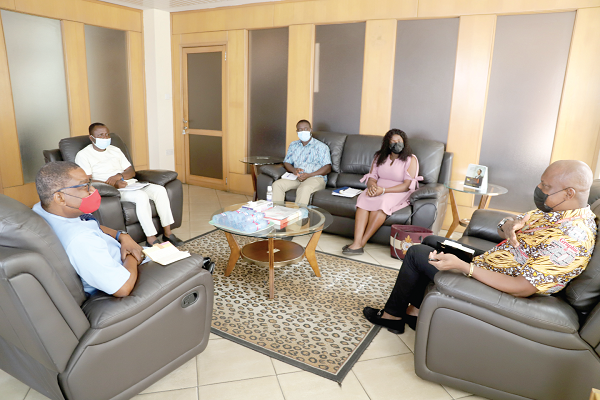
Graphic, USAID partner to enhance justice system
The management of the Graphic Communications Group Limited (GCGL) has reaffirmed its commitment to continue with its reportage as its contribution to bring justice delivery to the doorstep of the citizenry.
To that end, the GCGL, through its newspapers and online platforms, will also work closely with the Justice Sector Support Activity Project (JSSP) of the United States Agency for International Development (USAID) to increase citizens’ knowledge of and access to justice sector services, ensure accountability within the sector and citizens’ oversight of criminal cases.
Discussions on necessary arrangements to actualise that commitment took centre stage when some of the implementing partners in the USAID-funded project paid a courtesy call on the management of the GCGL in Accra last Thursday.
The delegation included the Executive Director of the Crime Check Foundation and Media Specialist for the JSSP, Mr Ibrahim Oppong Kwarteng; the Monitoring and Evaluation Specialist of the Legal Resources Centre (LRC), Mr Samuel Fant Kombian, and the Project Officer of the LRC, Ms Patience Lambi Adam.
Representing the GCGL were the Managing Director, Mr Ato Afful, and the Editor of the Daily Graphic, Mr Kobby Asmah.
Also present was a Corporate Communications Officer of the GCGL, Ms Yvonne Aryee.
Access to information
Mr Afful said information had become crucial, while most often people had little knowledge of their rights, hence the need for the newspaper brands to access relevant information to enable them to adequately equip citizens across the country to understand their rights.
“From our side as a national media brand that has a mandate to educate and inform, we are obliged to pass on adequate information to the public. We appreciate access to information sharing and training because access to information is critical to the dissemination of information — you cannot be accurate and factual if you do not have access,” he said.
Mr Afful noted that in most cases, people with information were hesitant to speak, a situation which created a void for people.
“Sometimes, this is what happens in the practice, and if you are not at the GCGL where the policy guidelines of fact checking, accuracy and truthfulness are instilled from the beginning of the business, somebody will say something, and before you begin to realign, the loss is already out there,” he added.
Again, he said, the Mirror Lawyer column was one of the avenues by which the paper contributed its quota to educating the public on their rights, adding: “The Mirror Lawyer addresses these conversations and they are critical, so let us unpack these ongoing conversations; for us, we are happy to support you. I think this is useful; it’s timely, especially as a developing people where technology and digitalisation have become a key part of what we do.”
Commendation
For his part, Mr Asmah commended the delegation for their effort to reform the justice system through the project.
He urged the team to make concrete efforts to share information with the brands of the GCGL for dissemination, adding: “We do not want half-baked information and we are more than willing to support you to bring justice delivery to the doorstep of the ordinary person.”
“We will give you the support that you need; this is your home so make good use of us,” he said.
“The media are all-knowing but don’t know it all; that is why experts such as you must come on board to assist us to disseminate great information and education. If we do this, Ghana will be better for all of us,” the Editor said.
Project
Commenting on the project, Mr Kwarteng said it had the intention of working with 30 journalists in 40 districts where it was being undertaken.
He said out of the number, three slots had been reserved for two regional correspondents from the GCGL and one journalist to serve as ambassador to help promote stories on the country’s justice system.
He further noted that some petty offenders had been on remand, saying without classified cells, those petty offenders could become hardened as they mixed with hardened criminals.
Mr Kwarteng, who described the Daily Graphic as a “big brand”, said partnership with the Daily Graphic was key to calling for reforms in the justice system.
JSSP
The JSSP is a project which focuses on monitoring and sustaining the implementation of Ghana’s Case Tracking System (CTS), an existing infrastructure which is not popular among the larger population
The CST is a platform launched in 2018 by the government of Ghana to collect, collate and harmonise statistical data for effective justice delivery among key stakeholder institutions in the country.
Launched in 2020, the three-year educational campaign project, which is being implemented in seven regions across the country, also seeks to strengthen advocacy on accountability by key justice sector institutions, including the Ghana Police Service, the Ghana Prisons Service, the Attorney-General`s Department, the Legal Aid Commission, the Economic and Organised Crime Office and the Judicial Service.
The seven regions are: Western, Greater Accra, Northern, Bono, Upper East, Ashanti and Volta.
